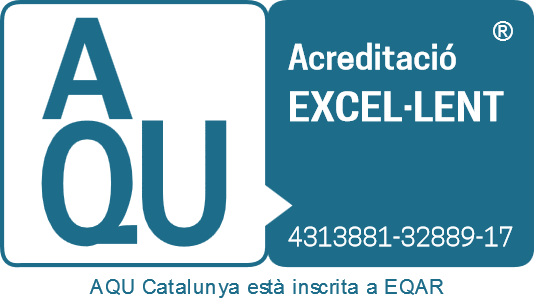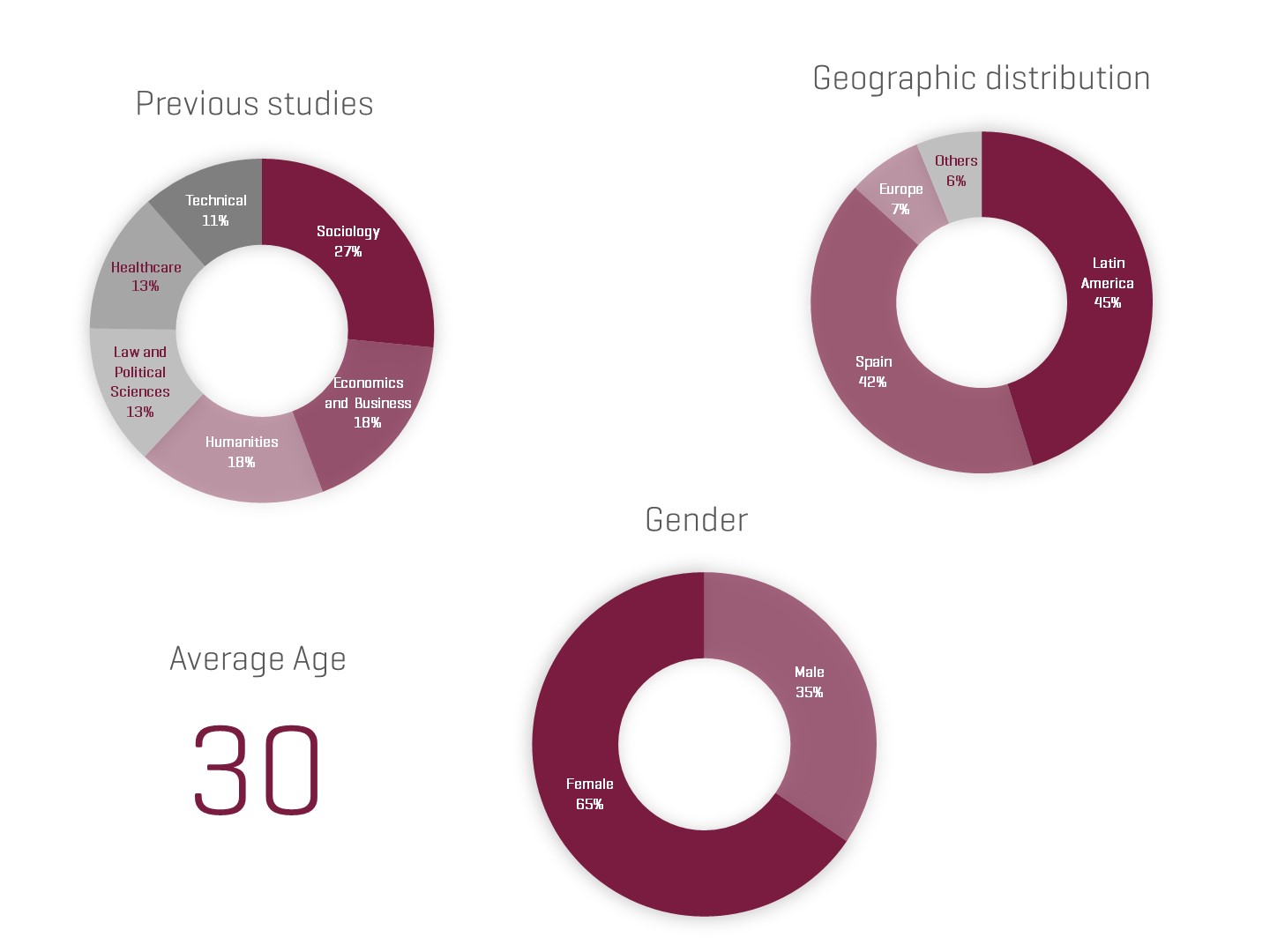Coordinator: Jordi Mundó Blanch
Credits: 90 ECTS
Language: 75% Spanish; 25% English
Approximate Fee level: 27.67 euros/crèdit (82.00 euros for students outside the EU or China and non residents in Spain). Fees pending official approval.
Applications: First period: 29 January – 30 June 2024. Second period (to fill available vacancies): 1 de July – 5 September 2024.

Overview
The Master’s Degree in Sociology: Social Transformations and Innovation of the University of Barcelona trains students to become scientists and professionals in the study of social change and the design and development of social technologies that meet the demands deriving from collective challenges while providing new solutions to them. This master’s degree prepares students with the necessary skills to successfully pursue a Doctoral programme in Sociology. The MSc in Sociology follows the directives of the European Higher Education Area (EHEA) and in 2017 obtained a quality award from the Catalan University Quality Assurance Agency.
You can check the official website of the Master here: https://web.ub.edu/en/web/estudis/w/masterdegree-m0v02?presentation
Programme content
In response to a structural condition of accelerated change, current sociology studies offer the most suitable approaches,models and methods to diagnose and analyse ongoing social transformations in all their complexity. Sociology studies are able to identify and assess the options for change applicable to individual cases, to conceive and evaluate intervention strategies and possible future societies.
Using a sociological approach, the master’s degree focuses on social transformation and innovation processes. These are located on different scales, from global (multiple modernities and globalization processes) to local issues (urban transformations, changes in life conditions or in intergenerational or gender relations) and also include changes in different sectors (culture, education and economics), as well as in public and private networks, institutions and organizations.
To fully understand these processes, students approach fundamental issues of contemporary societies (migrations, security, social inclusion and exclusion, conflict resolution, sustainable development, etc.). In all these fields, the analysis of change serves to unravel the key elements and to consolidate the competences that allow a positive impact on change, either by drawing desirable social futures, or by designing strategies for overcoming problems and fostering creativity and innovation.
The master’s degree is intended to put the sociological tool kit in use, so that students are provided with a comprehensive perspective on current social change and the strategic challenges it poses, while acquiring cross-disciplinary training for the scientific analysis of social transformation and innovation processes, and the skills required to design and evaluate intervention models.
The MSc in Sociology is taught exclusively face-to-face. The programme consists of 90 ECTS credits, divided into compulsory subjects (25 ECTS) and optional subjects (40 ECTS credits), as well as professional placements and the master’s degree final project (TFM). Full-time students can complete it in three semesters and part-time students in four semesters (two academic years).
Recommended pathway for full-time students:
First year (60 - 65 ECTS credits):
- Bridging courses: (compulsory for students with no previous training in sociology): 5 ECTS credits. (Not included within the 90 compulsory ECTS that make up the master’s degree).
- Compulsory subjects: 25 ECTS credits.
- Optional subjects up to*: 40 ECTS credits.
Second year (25 - 30 ECTS credits):
- Optional subjects: 5 ECTS credits.
- Master’s Degree Final Project: 20 ECTS credits.
*The recommended pathway does not exclude the possibility of introducing any necessary changes to meet the demands of particular students. For example, a student may complete optional subjects in the third semester of the second year. It is not compulsory for students to complete 40 ECTS credits in the first year.
Student profile

The Master’s Degree in Sociology trains approximately 30 students per academic year from diverse backgrounds, a diversity that enriches the programme with different academic, professional and life experiences.
Nearly 50% of students in the last academic years were nationals from other countries. Students come from Latin America (45%), Spain (42%), Europe (7%) and Asia (4%).
Generally, students of the Master’s Degree in Sociology hold a bachelor’s degree in the area of social sciences: Sociology (27%); Economics and Business (18%); Law and Political Science (13%); History, Anthropology, Humanities, Communication, Journalism, Advertising (18%); Psychology, Healthcare, Education, Social Work (13%) and also from technical bachelor’s degrees such as Engineering and Architecture (11%).
Students come from diverse universities, many of which are leaders in their geographical area: Pontificia Universidad Católica de Chile (Chile), Universidad Federal do Rio Grande do Sul (Brazil), University of Texas at Austin (United States), Heinrich Heine Universität Düsseldorf (Germany), Universidad del País Vasco/Euskal Herriko Unibertsitatea (Spain), Pontificia Universidad Javeriana (Colombia), Nankai University (China), Universidad Complutense de Madrid (Spain)…
The breakdown of students by gender for recent academic years is 65% women and 35% men. Students are 30 years old on average. The student profile shows that they either start this master’s degree immediately after their bachelor’s degree, when they are 22 or 23 years old, or at various life stages when they decide to go back to academic training to apply it to their professional careers.
Placements and career opportunities
Placements
Internship training agreements with students of the master’s degree in Sociology at the UB
The Master in Sociology: Social Transformations and Innovation of the Department of Sociology at the Faculty of Economics and Business of the University of Barcelona offers an opportunity to companies, public administrations and citizen organisations interested in establishing educational collaboration agreements with students of the Master’s degree in Sociology. These agreements are made in the form of academic internships and involve the three parties: the master’s students, the company, the public institution or civic organisation, and the university.
An opportunity to apply the knowledge acquired in the Master’s degree
While completing the Master’s degree in Sociology, students learn about social change and development trends, inequality dynamics’ evolution, and strategic planning’s importance in contemporary societies. Professional internships are a unique opportunity to apply that knowledge in a natural environment. Establishing internship agreements, among other things, allows Master’s students to obtain job opportunities, improve their network of contacts and improve their decision-making capacity.
During professional internships in companies, for example, they can help improve corporate communication strategies, evaluate future challenges or identify inequalities in terms of gender and diversity in the organisation. In internships in administrations or public institutions, students usually participate in tasks to evaluate policies, improve their communication strategies or analyse social inequalities and barriers to access to public services. Regarding practices in civic organisations, the established training agreements tend to focus on analysing the needs of a specific community or a particular group or improving the communication strategies of a campaign or initiative.
A valuable resource for companies and organisations
Incorporating Master’s students in sociology is a valuable resource for continuous improvement and adaptation to the social needs of many types of organisations. Establishing training internship agreements can be an opportunity to hire young, motivated talent who can analyse and solve problems. Furthermore, from the university’s perspective, these training projects are a gateway to other possible collaborations with the professional sector and a way to promote university social responsibility.
Administrative aspects of establishing training projects
The duration of the internship training projects with students of the official Master’s degree in Sociology at the UB is established for between 187,5 to 375 hours of work in the entity, and they have curricular recognition and support from an academic tutor. This period can be extended into two more training projects and 375 hours of extracurricular practices.
The agreement between institutions has no cost, but the establishment of the training project provides for the contribution, by companies and institutions, of €250 plus the current legal VAT, as management, for each student and training project.
The internship agreement also contemplates the contribution by the company or organisation of an amount for the student as a scholarship or study aid. We recommend that financial assistance to students be at least €5/hour to get closer to the average of what students at our faculty earn (more than €6/h). In addition, it must be considered that all academic internships contribute to Social Security.
Please note that the current regulations are available at this link.
For more information about the administrative procedure, don’t hesitate to contact practiques.fee@ub.edu directly or consult the frequently asked questions on the internship website of the Faculty of Economics and Business of the UB.
The academic managers of the practices of the Master of Sociology are Professor Ana Belén Cano (anabelencano@ub.edu) and Professor Santi Eizaguirre (santieizaguirre@ub.edu).
Career opportunities
At the end of this master’s degree, students are expected to reach the specific objectives linked to an appropriate application of sociological tools, an improved position in professional areas and, in general terms, to an improvement of social results. The skills acquired facilitate diverse career opportunities, given that this master’s degree is intended to:
- Train students as experts in social and organizational change, capable of leading analyses and effective management, whether in the public, private or the third sector and also as innovative social researchers qualified to work in all kinds of social research centres or to enrol in a doctoral programme.
- Train specialists with the skills and competences required to plan, design and execute social innovation and transformation proposals.
- Improve the professional skills of students with practical experience and experience in other areas of knowledge who wish to widen or enhance their theoretical training and technical abilities in sociology and in the analysis of social change and innovation.
75% of former students are working in activities related to academia, research or the master’s degree programme. 40% of former students decide to pursue further studies and enrol in a doctoral programme, whether at the University of Barcelona (50%) or at international institutions (50%).
Mobility
Students of the Master’s Degree in Sociology have the chance to participate in a mobility programme within the Erasmus programme, as well as through other UB agreements. Students are advised to complete their stay abroad during the second or third semester of the master’s degree and encouraged to complete at least 15 ECTS (preferably optional) credits at the host university. Currently the master’s degree offers the following Erasmus agreements, which include financial aid for students:
- Universiteit Gent – Ghent University (Belgium)
- Université catholique de Louvain – Catholic University of Louvain (Belgium)
- Univerzita Karlova – Charles University (Czech Republic)
- Københavns Universitet – University of Copenhagen (Denmark)
- Le Mans Université – University of Le Mans (France)
- Tampereen yliopisto – Tampere University (Finland)
The International Relations Office is in charge of managing the international mobility programmes of the Faculty of Economics and Business and of searching for new agreements with universities around the world. It actively contributes to the internationalization of the Faculty and, especially, of its students.
